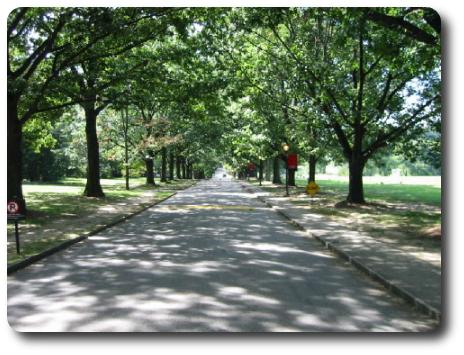The woman who helps make Haverford green
By Kulia Woodell
There is nothing that Claudia Kent likes better than to romp around outdoors and play in the dirt.
A woman who is clearly more comfortable assessing tree health and poking around in the perennial beds than sitting at a desk, Kent is Haverford College’s grounds manager and sustainability officer.
“I do a little bit of everything,” Kent says, laying down a long list of her daily duties. She is in charge of maintaining the athletic fields, mowing the grass, repairing washouts on the Nature Trail, and caring for the on-campus flora.
As the main player in the ‘greening’ of Haverford, she works with students to compost waste from the dining center for use in the student garden on campus.
“This year the garden gave us tomatoes, potatoes, beets, green peppers, and pounds of green beans,” Kent said. “Haverford is historically a farming school. We’ve kind of gotten away from that now, but I’m working on proposals for a big campus farm.”
She finds a new enthusiasm in talking about the Bur Oak next to Magill Library. “It’s 175 years old, and they can live to be 500,” she said. “I just love the trees. I think Haverford has amazing trees.”
Walking through the fall colors, or, as Kent specifies, the reds of the Sugar Maples and the golds of the Honey Locusts, she recalls growing up in rural England. “I was always outside building forts and playing in the fields and river,” Kent said.
Her family moved to Philadelphia when she was 9, and she has lived here for over thirty years. She first got a degree in communications from Temple University, but then realized that gardening was her true passion and went back for a degree in horticulture.
“I’ve always been an outdoor person,” Kent said. “I still am an outdoor person, whether it be for work or for fun.”
One thing that she’s particularly proud of is the meadows she’s started on campus, one by the Duck Pond and the other in the Pinetum. These meadows are planted with wildflowers and left unmowed, which cuts down on the use of greenhouse gas-spewing mowers. Meadows also create a habitat for wildlife and help to reduce soil erosion.
“I love native species,” Kent said, repositioning her baseball cap that’s embroidered with the silhouette of a tree. “I incorporate native species into everything that I’ve done. The college in general aims for 64 percent native, and between 2005 and 2008 we were up to about 84 percent native, which is huge.”
The issue with non-native plant species, Kent explains, is that although some birds will eat them, most insects will not. This creates a break in the food chain, since many animals need these insects as a food source. We also depend on these insects to pollinate our food-producing plants and to keep other insects in check.
Of her hobbies, Kent says that camping, backpacking, and bike riding are first and foremost. “I try to get to a national park every year. I plan to do all of the 58 national parks before I turn 50,” she said. So far, she’s about 25 parks in.
After a long pause, Kent explains her love of nature. “I love its spiritual power,” she said. “Especially in a national park you can feel it because it’s right there. There’s
this constant energy, this hum. I mean, here it gets kind of covered up with concrete but the energy and the connection is still always there.”
Thoughtful and quick to laugh, Kent wants everyone to be assured that plants and nature aren’t her only sources of joy. “I also love the Phillies. I got season tickets this year,” she said.
Eastern Red Cedar, White Pine, Winterberry Holly, Kent names some of the trees and shrubs as we pass them. “The most important thing that I do is try to change people’s perceptions on leading an environmental life. You don’t have to change that much,” she said. “You just have to educate them about balance and diversity in planting, and issues of recycling and what goes to the landfill.”
Her overall reflections on her work: “I love this. When the rest of my life gets rough, I just go and do a little weeding.”
